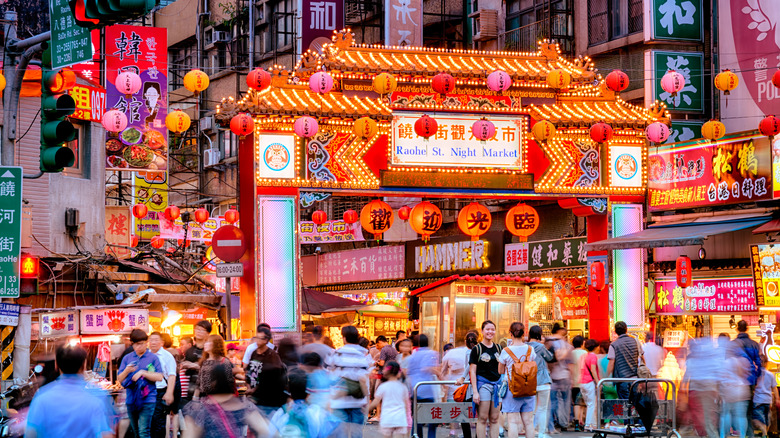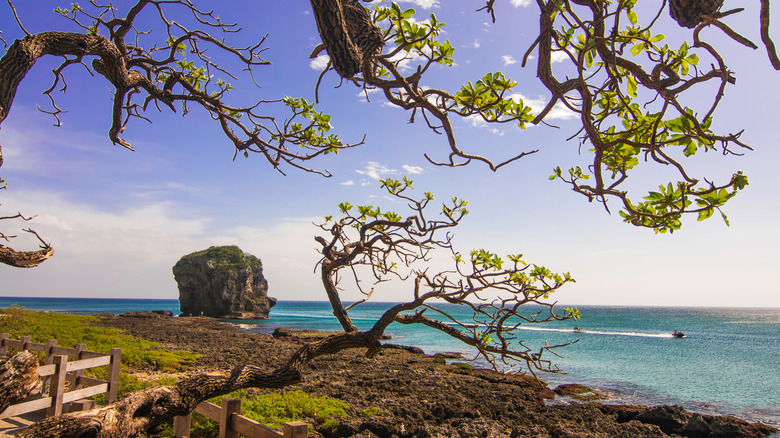Modern city life and nature’s bounty in Taiwan
Modern city life and natural beauty — that’s Taiwan in a nutshell. Taipei, the capital, is a dynamic metropolis with soaring skyscrapers, renowned markets, and vibrant nightlife. Take a free walking tour with Like It Formosa, check out iconic landmarks like Taipei 101, ride on the Maokong Gondola, and immerse yourself in the city’s cultural scene. The Chiang Kai-shek Memorial Hall, National Palace Museum, and quite a few of Taiwan’s 15,000 temples are located in Taipei — definitely worth a visit.
The island offers an astonishing variety of natural landscapes, from mountains to gorges, lakes, and coral reefs. In just a short drive or train ride, you can find yourself in the midst of stunning beauty at any one of the ten national parks in Taiwan. Taroko National Park, for example, is a must-visit destination for its marble canyons, hiking trails, and picturesque scenery. Yangmingshan National Park is somewhere you can see beautiful cherry blossoms, bathe in hot springs, and also participate in the 60-year-old annual springtime Flower Festival.
Taiwan’s mountains, including Yushan (the country’s tallest peak at nearly 13,000 feet) offer excellent opportunities for trekking and exploration. For beach lovers, Taiwan’s coastline boasts beautiful sandy shores and crystal-clear waters. Kenting National Park, in the southern part of the island, is a popular spot for water sports and relaxation. The bustling south city of Kaohsiung is known as “Taiwan’s Maritime Capital”. It’s home to many popular sites such as the Pier2 Art Center, Fo Guang Shan Buddha Museum, and Dream Mall, the largest shopping mall in Taiwan.
Taiwanese food and useful travel tips

Taiwanese cuisine is a fusion of Chinese, Japanese, and Korean flavors. From street food vendors to upscale restaurants, there’s a range to satisfy everyone. Visit the world-famous Din Tai Fung for xiao long bao dumplings — once you leave Taiwan, you can eat down memory lane at one of its 170 locations around the globe. Don’t miss the night markets, where you can indulge in delicacies like stinky tofu, beef noodle soup, and pineapple cake. Did you know that bubble tea was invented in Taiwan?
Whether taking public transport, dining out, or sightseeing, you will not be breaking the bank here. The average daily spend is between $40 to $100 per day, nearly half the travel budget for major Japanese cities like Tokyo and Kyoto. Although credit cards are widely accepted, cash is king, so always have some New Taiwan Dollars (NTS) with you. Getting around the island is cheap and convenient. With a transit EasyCard, you can ride Taipei’s MRT, Taiwan buses, or rent Youbikes for less than $2 per ride. Not to mention, Taiwan’s High-Speed Rail system (like the Japanese Shinkansen) is one of the fastest in the world, with trains reaching up to 186 miles per hour.
While Japan continues to be a top destination with nearly 30 million annual visitors, don’t overlook the magic of Taiwan. This underrated Southeast Asian gem is a destination that offers the best of all worlds. From skyscraper views to serene mountains to friendly locals and delicious milk tea, Taiwan invites you to explore its sensational treasures and create lasting travel memories.

